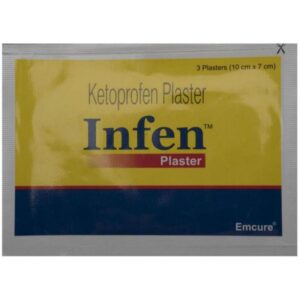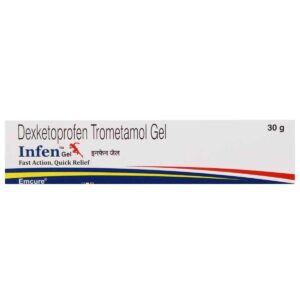IBUPROFEN + SODIUM PROPYL PARABEN
Ibuprofen: Ibuprofen is a nonsteroidal anti-inflammatory drug (NSAID) that is commonly used to relieve pain, reduce inflammation, and lower fever. It is available over-the-counter and by prescription.
The mechanism of action of ibuprofen involves inhibiting the production of prostaglandins, which are substances that cause pain, fever, and inflammation in the body. By reducing the production of prostaglandins, ibuprofen can help alleviate these symptoms.
The recommended dose of ibuprofen varies depending on the age and condition being treated. For adults, the typical dose ranges from 200 to 800 milligrams every 4 to 6 hours, not exceeding 3200 milligrams per day. It is important to follow the instructions provided by the healthcare professional or the directions on the packaging.
While ibuprofen is generally considered safe when used as directed, it can cause some side effects. Common side effects include upset stomach, heartburn, nausea, diarrhea, and dizziness. In rare cases, more serious side effects such as stomach ulcers, liver or kidney problems, and allergic reactions can occur. It is important to seek medical attention if any severe side effects occur.
It is worth noting that ibuprofen may interact with certain medications, so it is important to inform your healthcare provider about all the medications and supplements you are taking before starting ibuprofen. Additionally, ibuprofen should not be used by individuals with certain medical conditions, such as a history of stomach bleeding or ulcers, liver or kidney disease, and asthma.
Overall, ibuprofen is a widely used medication for pain relief, reducing inflammation, and reducing fever. However, it is essential to follow the recommended dose and consult a healthcare professional if there are any concerns or questions about its use.
Sodium Propyl Paraben: Sodium Propyl Paraben is a medication primarily used as a preservative in various pharmaceutical and cosmetic products. It belongs to the class of parabens, which are a group of chemicals commonly used as preservatives due to their antimicrobial properties.
The main mechanism of action of Sodium Propyl Paraben is to inhibit the growth of bacteria, fungi, and other microorganisms. It does this by interfering with their cell wall synthesis and disrupting their metabolism. This property helps to prevent the spoilage of products and extend their shelf life.
The dose of Sodium Propyl Paraben varies depending on the specific product in which it is used. As a preservative, it is typically added to formulations at concentrations ranging from 0.1% to 0.5%.
Although Sodium Propyl Paraben is generally considered safe for use, some individuals may experience allergic reactions or sensitivities to this chemical. Common side effects may include skin irritation, redness, itching, or swelling at the site of application. In rare cases, it may cause more severe allergic reactions such as contact dermatitis or hives.
It is worth noting that there has been some controversy regarding the use of parabens in consumer products. Some studies have suggested a potential link between parabens and certain health concerns, such as breast cancer, although further research is needed to establish a conclusive association.
Overall, Sodium Propyl Paraben is widely used as a preservative in many pharmaceutical and cosmetic products due to its effectiveness in inhibiting the growth of microorganisms. However, individuals with known sensitivities or allergies to this substance should avoid products containing Sodium Propyl Paraben or consult a healthcare professional before using them.


